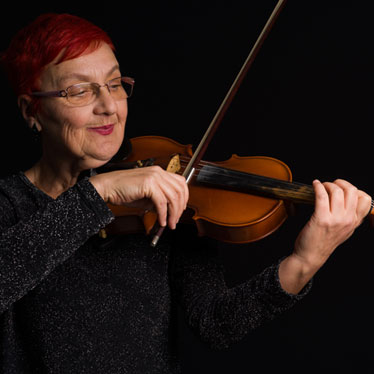What To Look For In A Violin Teacher As An Adult Learner

Finding the right violin teacher can be more challenging for adult learners than it is for children. For one thing, the balance of power is decidedly more equal; for another, adults often have a more difficult schedule to contend with as the result of work, home life, meeting children's extracurricular needs, etc.
That being said, finding the right violin teacher is the key to a pleasant experience as you move from beginner to intermediate and advanced levels. It's worth taking the time to find a teacher who keeps you inspired, motivated and having some fun along the way.
They teach - and enjoy teaching - adults
You may be surprised at how many violin teachers simply refuse to teach adults. There are many reasons for this, not the least of which may be the sheer physical proximity required - and even direct physical touch as they adjust an arm, the wrist, body positions, etc., - when teaching beginners.
Regardless, look for a teacher who specializes in teaching adult students and perhaps even leads an evening adult group in their studio or music school. Similarly, some junior colleges offer music classes or summer camps oriented towards adults, providing another way to try the instrument out and connect with a teacher who enjoys teaching adult students or who can refer you to another instructor who does.
They accommodate an adult’s schedule
Believe it or not, children are often much more reliable than adults when it comes to showing up for lessons, practicing, and not canceling at the last minute as the result of schedule changes. This is difficult for violin teachers to contend with and may cause them to be wary of taking on adult students when they have a relatively full roster.
If your schedule is at all unpredictable, or your children's schedule may cause you to be unpredictable, be honest about that up front. Be clear about what you can commit to – even if that means you won't always be able to practice between classes. This honesty and clarity about how cancelations, schedule changes, and appropriate charges will be handled up front may help to open the door to teachers who wouldn't have taken you on otherwise.
You feel comfortable with him/her
As we mentioned above, your teacher should inspire you and compel you to excel at your newfound interest. This won't be possible if you don't like the individual or you feel uncomfortable in his/her presence. Also, posture and positioning are very important when it comes to playing the violin - both for your ergonomic health as well as to create beautiful sounds. This means the teacher has to occasionally touch you or adjust your body (all very reasonably and modestly, of course). Therefore, being trusting and comfortable in the instructor's presence is inherent to your success.
S/he supports your goals - however small or large
It could be that you are a prodigy in disguise, a future professional violinist who never had the chance to discover your raw talent due to lack of exposure or opportunity. In most cases, however, adult students will slowly progress from stumbling beginner to decent intermediate level playing. If you love it, you will continue to practice and play the violin on up into more advanced levels - but that takes a few years or more of diligent effort.
What's your teacher's take on this? Are they okay with the fact that you may never perform in a concert and that you play simply for the adventure and the joy of it? Or will s/he stubbornly insist the goal is to get you into the local symphony or conservatory as soon as possible? Similarly, if you harbor the desire to play for the local symphony or conservatory, but you're currently a bumbling beginner, will s/he patiently nurture your goal without implying your days were numbered a long time ago?
Finding a teacher who graciously accepts where you're at, supports your growth, but is neither condescending nor hyper-pressurizing is key to a positive learning experience.
Understand the way may not be as easy as you hope
If you've played an instrument well before or you're returning to the violin - you may progress faster than normal. However, most adults are absolutely flummoxed by how awkward they feel and how slow the going is as they begin playing the violin. This is great news for their children, who now find parents more sympathetic to their own "beginner" plights in life. But it can be detrimental to the poor, patient teacher who may be blamed for your lack of progress.
Have a realistic idea – based on a heart-to-heart – conversation with your teacher, about what to expect over the next month, six-months, one-year, etc., so you don't become disheartened.
In the meantime, continue checking back with here, at the StringOvation blog to read up-to-date tips, information, and inspiration as you begin this exciting chapter as a beginning adult violinist.
Article sponsored by Thomastik-Infeld


